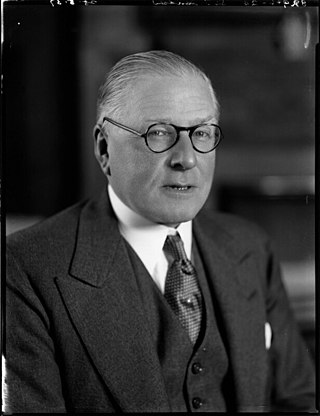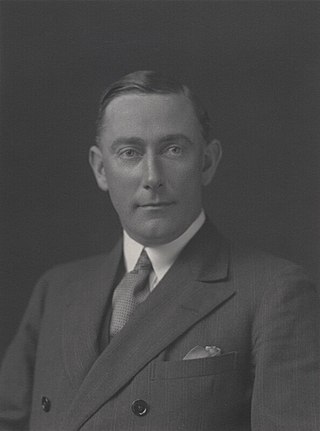Related Research Articles

John Colin Campbell Davidson, 1st Viscount Davidson,, known before his elevation to the peerage as J. C. C. Davidson, was a British civil servant and Conservative Party politician, best known for his close alliance with Stanley Baldwin. Initially a civil servant, Davidson was private secretary to Bonar Law between 1915 and 1920. After entering parliament in 1920, he served under Baldwin as Chancellor of the Duchy of Lancaster between 1923 and 1924 and as Parliamentary and Financial Secretary to the Admiralty between 1924 and 1926. From 1926 to 1930 he was Chairman of the Conservative Party. He was once again Chancellor of the Duchy of Lancaster between 1931 and 1937, firstly under Ramsay MacDonald and from 1935 onwards under Baldwin. On Baldwin's retirement in 1937, Davidson left the House of Commons and was ennobled as Viscount Davidson. Despite being only 48, he never took any further active part in politics. His wife Frances, Viscountess Davidson, succeeded him as MP for Hemel Hempstead. Lord Davidson died in London in 1970.

Thomas Jeeves Horder, 1st Baron Horder, was a British physician best known for his appointments as physician-in-ordinary to Kings Edward VII, George V, and George VI, and extra physician to Queen Elizabeth II. He was also the chosen physician of three prime ministers. He was knighted in 1918, made a baronet in 1923 and raised to the peerage in 1933.
The Golden Jubilee Honours for the British Empire were announced on 21 June 1887 to celebrate the Golden Jubilee of Queen Victoria on 20 June 1887.
The King's Birthday Honours 1901 were announced 9 November 1901, the birthday of the new monarch Edward VII. The list included appointments to various orders and honours of the United Kingdom and British India.
The 1902 Birthday Honours were announced on 10 November 1902, to celebrate the birthday of Edward VII the previous day. The list included appointments to various orders and honours of the United Kingdom and the British Empire.
The 1904 Birthday Honours were announced on 9 November 1904, to celebrate the birthday of King Edward VII that day. The list included appointments to various orders and honours of the United Kingdom and the British Empire.
The 1901 New Year Honours were appointments to various orders and honours of the United Kingdom and British India.
The 1902 Coronation Honours were announced on 26 June 1902, the date originally set for the coronation of King Edward VII. The coronation was postponed because the King had been taken ill two days before, but he ordered that the honours list should be published on that day anyway.
The Queen's Birthday Honours 1900 were announced on 23 May 1900 in celebration of the birthday of Queen Victoria. The list included appointments to various orders and honours of the United Kingdom and British India.
The Queen's Birthday Honours 1899 were announced on 3 June 1899 in celebration of the birthday of Queen Victoria. The list included appointments to various orders and honours of the United Kingdom and British India.
The Queen's Birthday Honours 1898 were announced on 21 May 1898 in celebration of the birthday of Queen Victoria. The list included appointments to various orders and honours of the United Kingdom and British India.
The 1941 New Year Honours were appointments by King George VI to various orders and honours to reward and highlight good works by citizens of the United Kingdom and British Empire. They were announced on 31 December 1940.
The 1899 New Year Honours were appointments by Queen Victoria to various orders and honours of the United Kingdom and British India.
The 1903 New Year Honours, announced at the time as the Durbar Honours, were appointments to various orders and honours of the United Kingdom and British India. The list was announced on the day of the 1903 Delhi Durbar held to celebrate the succession of King Edward VII and Queen Alexandra as Emperor and Empress of India. The membership of the two Indian Orders were expanded to allow for all the new appointments.
The New Year Honours 1904, announced at the time as the Indian Honours, were appointments to various orders and honours of British India. The list was published in The Times on 1 January 1904, and the various honours were gazetted in The London Gazette on the same day.
The New Year Honours 1905, announced at the time as the Indian Honours, were appointments to various orders and honours of the United Kingdom and British India. The list was published in The Times on 2 January 1905, and the various honours were gazetted in The London Gazette on the following day.

The 1895 Prime Minister's Resignation Honours were announced in the British national press on 1 July 1895 following the resignation of Lord Rosebery's government on 22 June. The appointments to the Order of the Bath appeared officially in the London Gazette of 2 July.
Sir Geoffrey Storrs Fry, 1st Baronet, was private secretary to prime ministers Bonar Law and Stanley Baldwin, and a member of the Fry family.

Sir Robert Patrick Malcolm Gower was a British civil servant who served as the Principal Private Secretary to the Prime Minister between 1922 and 1928.
Lieutenant-Colonel Sir Ronald Dockray Waterhouse was a British Army, Royal Air Force officer and civil servant. During his career, he was private secretary to the Duke of York, and to three prime ministers: Bonar Law, Stanley Baldwin, and Ramsay MacDonald.
References
- ↑ to The London Gazette, Supplement No. 32827, Page No. 3739, 25 May 1923
- ↑ "British Medical Association". British Medical Journal. 1 (3257): 946. 2 June 1923.